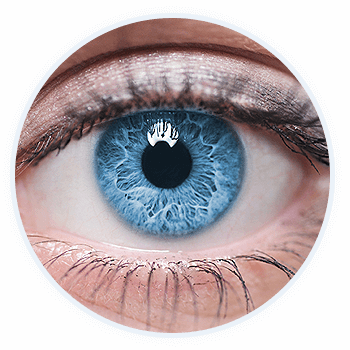
Seeing flashes or floaters for the first time can be alarming. Although sometimes harmless, new onset of flashes or floaters may be warning signs of a serious eye condition.
If you notice an influx of floaters or new flashes, it’s best to visit your eye doctor immediately to ensure your vision is not at risk.
What Are Flashes and Floaters?
Flashes and floaters are often annoying visual symptoms. When you first notice them, you may be tempted to ignore them and hope they go away.
Although they may not be a symptom of something serious, in some cases, flashes and floaters can signify a current or impending retinal detachment.
Floaters
Floaters are small spots that appear in your vision and may look different to each person. Frequently floaters appear as clouds, lines, circles, spiderwebs, or tiny spots in your field of vision.
For some people, floaters are more visible when they are looking at a plain background like a blank wall or the sky. Sometimes, floaters are large and distracting, other times, they are small and not as noticeable.
Floaters are tiny clumps of gel or cells inside the vitreous, the clear jelly-like fluid that fills the eye. Although these spots may look like they are in front of your eye, they are floating inside your eye.
What you see are shadows that these clumps of gel cast on the retina. The retina is a layer of tissue located at the back of the eye that senses light and allows you to see.
If your floaters are in combination with flashes of light, it is important to schedule an appointment with your eye doctor in a timely manner.
Flashes
Flashes typically appear in the peripheral vision. They may appear as lightning bolts, flashing lights, or like a camera flash. Flashes may continue to appear on and off for a couple of weeks.
As the vitreous gel inside the eye changes as you age, it can begin to shrink and tug on the retina. This can cause you to see flashes of light and may cause a retinal detachment.
As soon as you notice new flashes, schedule an appointment with your eye doctor immediately.
What is a Retinal Detachment?
A retinal detachment occurs when the retina tissue disconnects from the eye’s back wall. When this happens, it can cause various symptoms, including flashes of light, floaters, and vision changes.
A retinal detachment is a medical emergency. If left untreated, it can lead to permanent loss of vision.
Besides flashes and floaters, you may also notice a change in your peripheral vision. Some people report seeing a curtain, shade, or veil coming across their field of vision during a retinal detachment.
Flashes and floaters can be a warning sign of a retinal detachment before it actually detaches from the eye. For this reason, it is very important to visit your eye doctor if you notice any symptoms of retinal detachment.
How Do Eye Doctors Treat Flashes and Floaters?
In some cases, flashes of light and floaters do not indicate a retinal detachment. In this case, your eye doctor will likely monitor your eyes periodically.
Many times, flashes of light and floaters are a sign of another eye condition called posterior vitreous detachment, or PVD. This condition is much less severe than a retinal detachment.
A PVD occurs when the gel inside your eye shrinks and begins to tug on the retina. If you are diagnosed with a PVD, your eye doctor will continue to monitor your eyes to ensure you are not at risk of retinal detachment.
A tear in your retina can almost always be successfully treated with a laser. If your eye doctor determines that your symptoms of flashes and floaters are indicative of a retinal detachment, you will need treatment right away to ensure that you do not lose any vision.
To treat a retinal detachment, your eye doctor will perform surgery to help reattach your retina to the back wall of your eye.
Are you experiencing flashes and floaters? Schedule an appointment at VisionPoint Eye Center in Bloomington, IL, today!










